10 Best Marketing Books for Business Success in 2025

These days, it feels like everyone is writing a marketing book. For many marketers, publishing a book is less about sharing valuable insights and more about boosting their personal brand—appearing credible, authoritative, and “cool” in their field. Platforms like Amazon have made this even easier, turning book publishing into a self-service process that only takes a few clicks.
The result? We’re flooded with hundreds (if not thousands) of new marketing books every month, most of which add little value. At best, they waste your time. At worst, they mislead you with terrible advice that can set you up for failure.
Over the years, I’ve read plenty of bad marketing books, but I’ve also found a few gems that truly changed how I work. In this post, I’ll share a handpicked list of the best marketing books—ones that are actually worth your time.
Why Should We Read Marketing Books?
In today’s world, digital marketing experts are everywhere, constantly selling advice. But it’s often hard to tell if their ideas are truly original, simply recycled from others, or—worse—completely made up, potentially leading people down the wrong path.
So, what’s the best way to learn marketing? Should you take a marketing course, read a book, or do both? It can feel overwhelming. The truth is, many of today’s marketing “influencers” often repeat ideas that have already been documented in books—some of which go back decades or even centuries.
Reading is a more focused and active way of learning compared to other methods. For example, you can listen to a podcast while walking or looking at nature, but reading requires your full attention. Your brain works harder to process what you’re reading, which helps you absorb the information more deeply, storing it in both your conscious and subconscious mind.
Another advantage of books is the thoughtfulness behind them. Writing a book takes months, sometimes years. Authors carefully choose their words, rewrite, and edit multiple times, knowing their work will be published for the world to see.
When you read a book, you’re diving into the author’s deepest thoughts and ideas—everything they worked hard to put on paper. That’s what makes books special.
Sings for a Great Marketing Book
There is no easy way to find the best marketing books. Some are worth your time, while others should be skipped. There’s no specific definition of what makes a book “great” either—it depends on your current skills, your company’s growth stage, strategy, scale, and goal. Here are a few key indicators to help you identify a marketing book that’s right for you.
Strategy vs. tactics
When choosing marketing books, it’s often better to focus on those covering strategy rather than specific, actionable tactics. Here’s why:
- Tactics evolve too quickly in today’s digital landscape. By the time a book is published, those “latest trends” may already be outdated. If you want trending tactics, go to blogs and communities.
- Strategy-focused books provide high-level insights that can guide your approach regardless of changing tools or platforms.
For instance, many of the best marketing books are decades old—some over 50 years—but they remain valuable because they focus on principles and strategies, not step-by-step guides like “How to use Google Tag Manager.”
Target audience
Understanding who the book is written for is also an important key. Authors often clarify this upfront, so pay attention at the beginning of the book.
- Some books, like Lost and Founder, are ideal for startup founders and marketing leaders, offering insights that fit their unique challenges.
- Others, like Revenue Marketing, are best suited for executives who have the authority to drive organizational changes.
- Many books focus on marketers who will implement strategies themselves.
Before diving in, make sure the book aligns with your role and your ability to act on its advice.
Stage and industry of the company
It’s easy for marketers to get carried away with exciting ideas, but not every book applies to every company stage or industry.
- A strategy that works for a later-stage enterprise with a big budget and team size may derail an early-stage startup with limited resources.
- Check the author’s background: Do they have experience in your type of business? Have they focused on B2B, B2C, or a specific industry?
This doesn’t mean you should dismiss a book entirely if it’s not a perfect fit. Instead, put its advice in context and prioritize what makes the most impact on your business. As a marketing professional, your role is to identify opportunities with the highest potential and focus on what matters most.
Red flags
Not all books are created equal, and there are clear red flags to avoid:
- Author’s Bio: Be cautious of authors with no proven real-world experience. A great marketing book is usually written by someone who has actually done what they’re writing about. Otherwise, it’s often just a collection of ideas rehashed from other books and blog posts.
- Amazon Reviews: While reviews can help, they are easily manipulated, so don’t rely on them entirely.
- Clarity of Content: Even experts can struggle to clearly communicate their knowledge in book form. A deep understanding of a topic doesn’t always translate to great writing.
Best Marketing Books You Shouldn’t Miss (2025 Updated)
1. “Quantum Marketing: Mastering the New Marketing Mindset for Tomorrow’s Consumers” by Raja Rajamannar
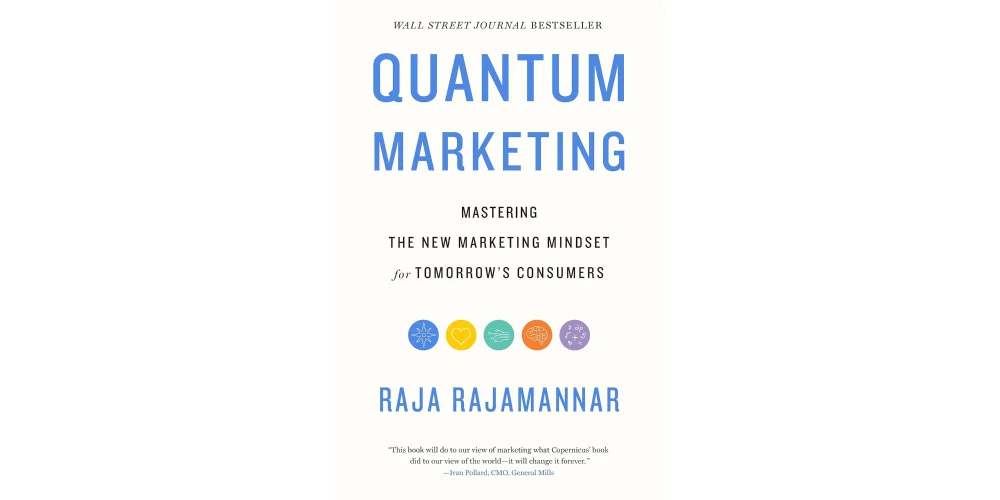
Mastercard’s CMCO, Raja Rajamannar, brings over 30 years of global experience from leading firms like Anthem and Humana. Recognized as one of the top marketing innovators by Forbes and Business Insider, his work has even been featured in case studies at Harvard and Yale.
Published in 2021, Quantum Marketing dives into the revolutionary strategies marketers need to stay relevant in today’s fast-changing, tech-driven world. It covers key topics like managing massive amounts of data and building strategic partnerships, providing a roadmap for thriving in this new era of business.
Key Takeaways:
- The book blends traditional marketing ideas with innovative technology strategies to help marketers adapt to the digital age.
- It offers actionable insights for navigating a fast-changing digital landscape.
- Real case studies make the concepts easy to understand and engaging for readers.
2. “Contagious: Why Things Catch On” by Jonah Berger
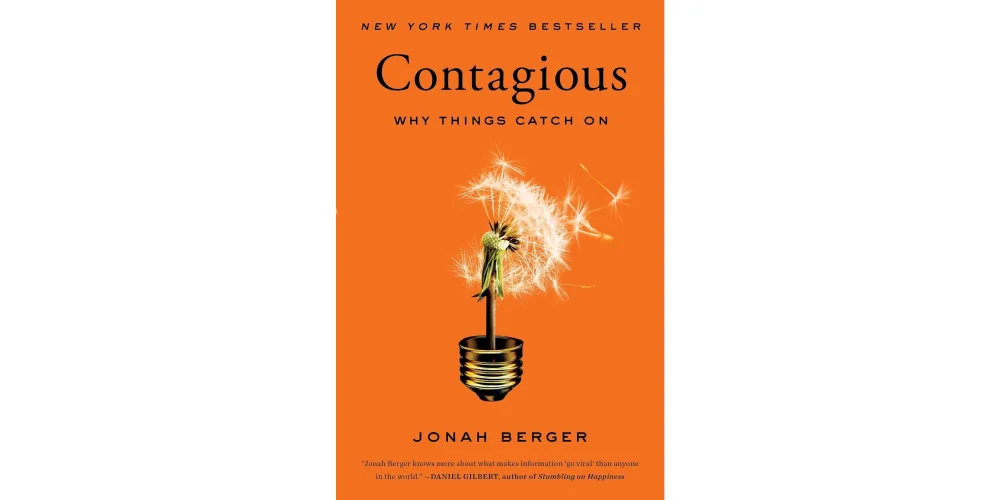
Contagious is a must-read for marketers, combining groundbreaking research with engaging stories to explain why certain products, ideas, or messages spread more than others. If you’ve ever wondered why people talk about some things and not others, this book offers clear, practical answers.
Jonah Berger reveals that most product-related discussions happen through word-of-mouth, not online. To help marketers make their ideas or products “go viral,” he introduces six key principles known as STEPPS: Social Currency, Triggers, Emotions, Public Visibility, Practical Value, and Stories. These concepts are rooted in human behavior and psychology, making the book both informative and entertaining.
Key Takeaways:
- Social Currency: People share things that boost their status or make them look good.
- Triggers: Environmental cues remind people of your product or idea, encouraging them to talk about it.
- Emotion: Content that evokes strong emotions—like awe, excitement, or anger—is more likely to be shared.
- Public Visibility: Ideas or products that are easy to see and imitate spread more quickly.
- Stories: Memorable stories that carry a message or emotional hook are more likely to be shared and remembered.
Whether you’re promoting a product, idea, or campaign, Contagious provides actionable techniques to create content that people will talk about and share.
3. “The 1-Page Marketing Plan” by Allan Dib
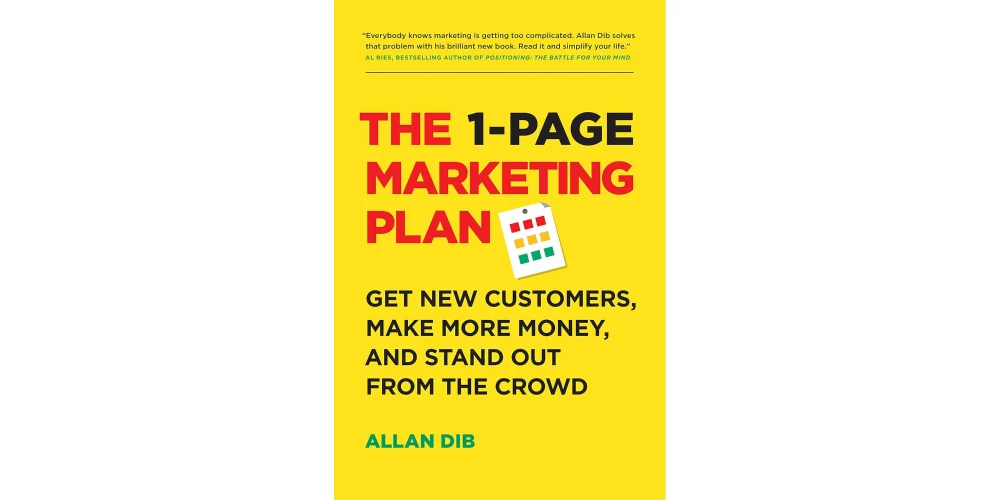
Allan Dib, a well-known marketer, speaker, and entrepreneur, is recognized for helping businesses achieve rapid growth by combining his expertise in technology and marketing.
The 1-Page Marketing Plan (2018) offers a simple, step-by-step method to create a clear and effective marketing strategy on a single page. This streamlined approach helps businesses attract new customers, boost growth, and execute their plans without feeling overwhelmed.
Key Takeaways:
- Practical and Actionable: The book provides clear instructions that you can apply right away to improve your marketing efforts.
- Simple and Accessible: It breaks down complex marketing ideas into easy-to-understand concepts, making it suitable for readers at any level.
- Real-Life Examples: Relatable case studies and examples show how the strategies work in real-world situations, keeping readers engaged and inspired.
With its concise and actionable approach, The 1-Page Marketing Plan is an essential guide for anyone looking to simplify and supercharge their marketing strategy.
4. “InstaBrain: The New Rules for Marketing to Generation Z” by Sarah Weise
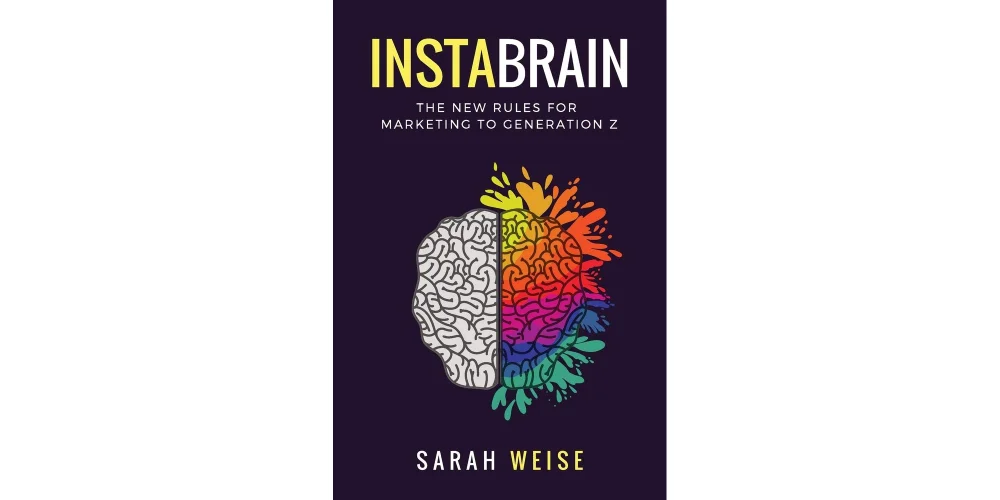
Sarah Weise, founder and CEO of the award-winning market research firm BIXA, is an expert in understanding why customers behave the way they do. With experience working with over 100 major brands like Google, IBM, and Capital One, as well as lecturing at Georgetown University, Weise brings deep insights into modern consumer behavior.
InstaBrain highlights the power of Generation Z (ages 13–24), who now outnumber Millennials and account for 40% of consumers with $44 billion in direct buying power. Despite this, many marketing teams remain focused on Millennials, overlooking the unique opportunities Gen Z presents.
This generation of digital natives thinks, buys, and engages differently, requiring a fresh approach to marketing. Sarah Weise combines captivating insights and real stories from extensive youth research to provide a guide for connecting with this influential audience.
Key Takeaways:
From this book, you’ll learn:
- Where Gen Z looks for different types of content
- What captures their attention
- How they make purchasing decisions
- What keeps them loyal to brands
- How to adjust your marketing strategy to resonate with this generation
Packed with actionable strategies and real-world examples, InstaBrain equips you with the tools to understand and engage Generation Z effectively, ensuring your brand stays relevant in today’s evolving market.
5. “Hug Your Haters” by Jay Baer
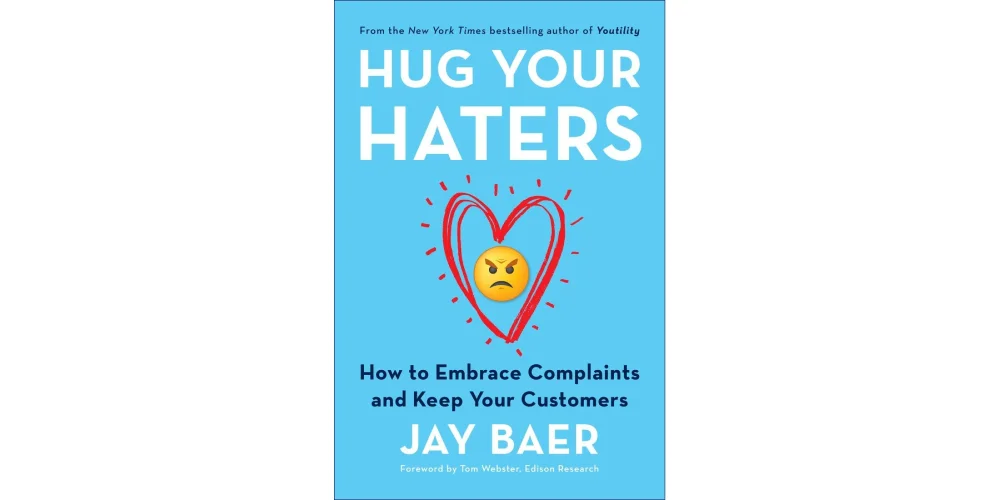
Jay Baer, a renowned marketing expert and president of the consulting firm Convince & Convert, has worked with leading organizations like Nike and the United Nations. A New York Times best-selling author, Baer delivers valuable insights on turning negative customer feedback into opportunities for loyalty and growth.
In Hug Your Haters (2016), Baer provides a practical guide for businesses to navigate customer complaints, especially in the digital age. Using real-world examples and actionable strategies, he shows how companies can win over even their harshest critics.
Key Takeaways:
- Understanding Complaints: The book explores why customers complain and how businesses can turn complainers into loyal advocates.
- Managing Public Complaints: Backed by case studies, it offers techniques to handle public complaints on platforms like social media effectively.
- Engaging and Practical: Baer makes customer service an engaging topic, providing clear, actionable advice that readers can apply right away.
Hug Your Haters is an essential read for businesses looking to transform customer complaints into meaningful opportunities for connection and loyalty.
6. “Building a StoryBrand” by Donald Miller
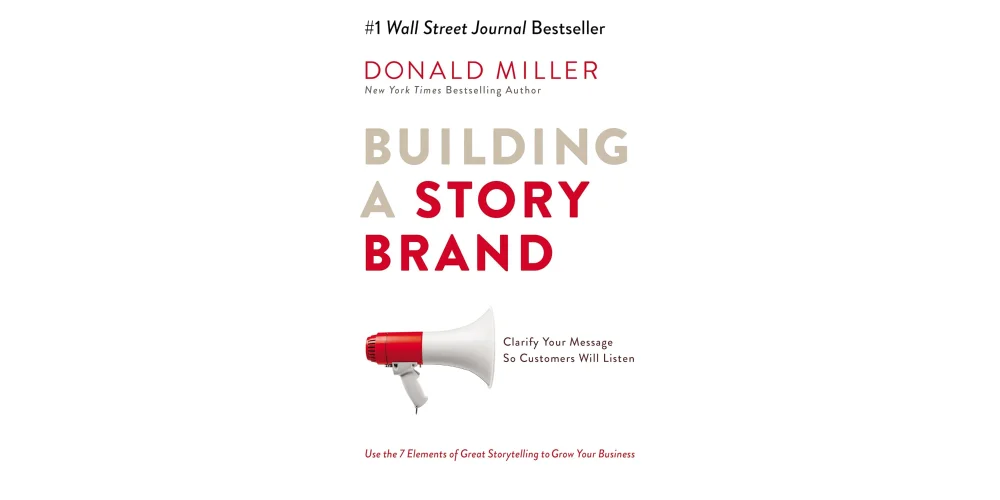
Donald Miller, CEO of the StoryBrand marketing agency and a New York Times best-selling author, delivers a practical guide to crafting clear and impactful marketing messages in Building a StoryBrand (2017).
This book introduces a seven-part storytelling framework that helps businesses communicate their value in a way that resonates with customers and drives results. By focusing on simplicity and clarity, Miller ensures no potential customer ignores your message.
Key Takeaways:
- Step-by-Step Framework: The book provides a clear process for creating a compelling brand story that engages customers.
- Practical and Actionable: Real-world examples and exercises make it easy for businesses to apply the concepts and communicate their value effectively.
- Clear and Engaging: Miller’s emphasis on simplicity keeps readers focused and ensures the content is both useful and engaging.
Building a StoryBrand is an essential read for anyone looking to refine their messaging and connect with customers in a meaningful way.
7. “The 22 Immutable Laws of Marketing” by Al Ries and Jack Trout
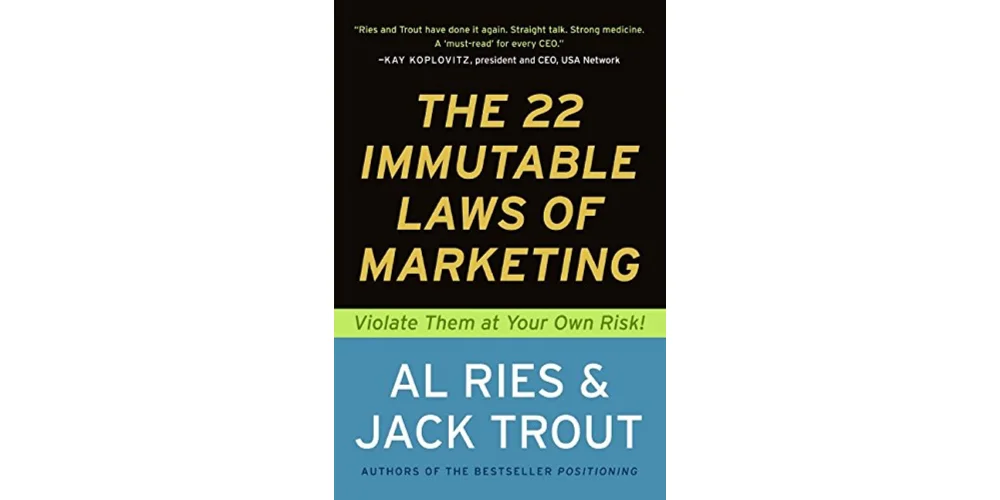
Al Ries and Jack Trout, two famous and highly respected marketing experts, have worked with top companies like Apple, AT&T, and Procter & Gamble, and authored several influential books on marketing strategy.
The 22 Immutable Laws of Marketing (1994) outlines timeless principles for building effective marketing strategies. Through clear, practical advice and real-world examples, it teaches readers how to avoid common mistakes and compete successfully in even the toughest markets.
Key Takeaways:
- Practical and Actionable: The book provides essential strategies to help businesses navigate the challenges of marketing and gain a competitive advantage.
- Real-World Insights: It uses examples and case studies to show how these principles apply in real-life situations.
- Engaging and Educational: By analyzing past marketing successes and failures, the book offers thought-provoking lessons that are both insightful and easy to understand.
This classic is a must-read for marketers looking to master the fundamentals and build strategies that stand the test of time.
8. “The New Rules of Marketing and PR” by David Meerman Scott
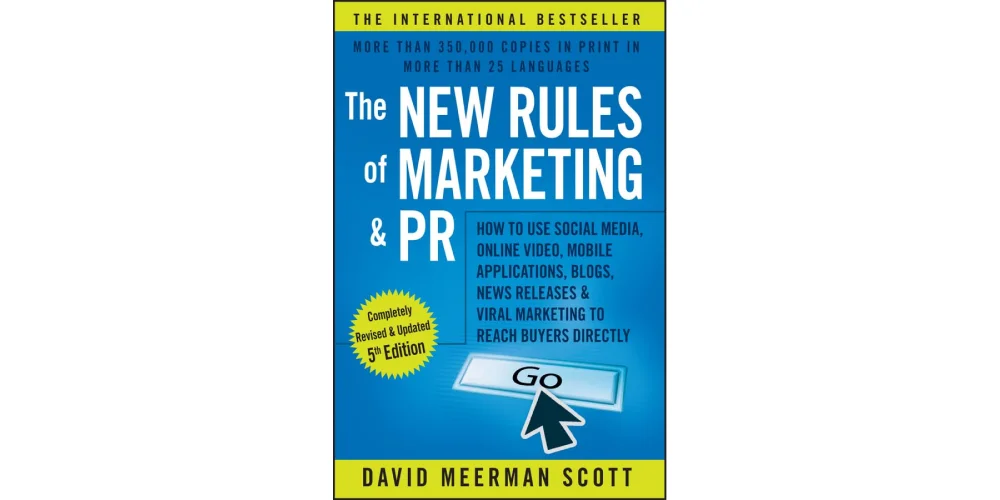
David Meerman Scott, a renowned marketing strategist, speaker, and bestselling author, shares his expertise in The New Rules of Marketing and PR (2007). Formerly a VP of marketing at NewsEdge (now part of Thomson Reuters), Scott delivers actionable insights for mastering online marketing in today’s fast-paced digital world.
This book explains how businesses can authentically and effectively communicate on social media and other online platforms to reach a wider audience and elevate their brand.
Key Takeaways:
- Practical Strategies: The book provides proven methods for using social channels and online platforms to engage your target audience.
- Up-to-Date Insights: It highlights current trends and technologies, helping you stay ahead in the ever-evolving marketing landscape.
- Human-Centric Marketing: By focusing on authentic storytelling and building real connections, it encourages a relatable, engaging approach to marketing.
Whether you’re new to digital marketing or looking to refine your strategies, The New Rules of Marketing and PR offers clear, practical advice to help you succeed in the digital age.
9. “Made to Stick: Why Some Ideas Survive and Others Die” by Chip Heath and Dan Heath
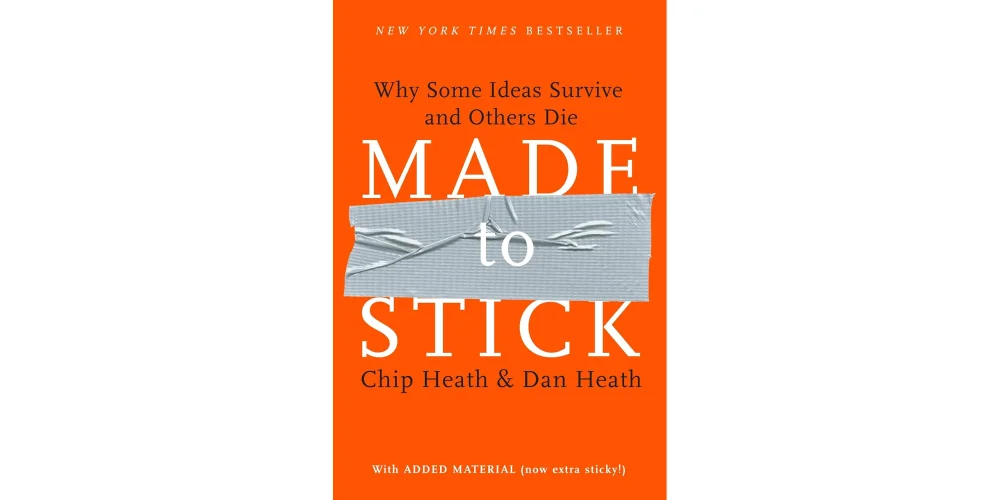
Written by brothers Chip Heath, a Stanford professor, and Dan Heath, a consultant and founder of Thinkwell, Made to Stick (2007) explores why certain ideas capture attention and stay in our minds, while others are quickly forgotten.
The book reveals the essential traits that make ideas “sticky” and provides a clear framework for crafting messages that people remember and act on.
Key Takeaways:
- Practical Framework: Using real-world examples and case studies, the book offers actionable techniques for creating messages that are persuasive and memorable.
- Simplify and Make Concrete: It stresses the importance of simplifying complex ideas and making them tangible so they are easier to understand and retain.
- Sticky Principles: The authors highlight key elements like emotion, storytelling, and unexpectedness, which are crucial for capturing attention and inspiring action.
Made to Stick is an essential guide for anyone looking to communicate ideas effectively, whether you’re in marketing, teaching, or any field where ideas need to make a lasting impact.
10. “Everybody Writes: Your Go-To Guide to Creating Ridiculously Good Content” by Ann Handley
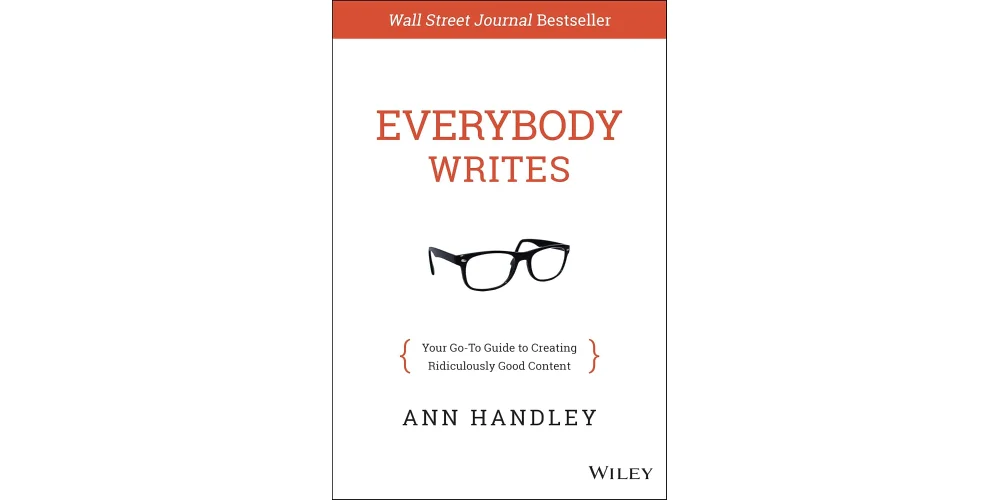
Ann Handley, named one of Forbes’ most influential women in social media, is the chief content officer of MarketingProfs and a columnist for Entrepreneur magazine. She’s also the co-author of the bestselling Content Rules.
In Everybody Writes (2014), Handley shares practical advice for creating outstanding content, from improving grammar to writing engaging social media posts, emails, and blog articles. This book provides simple, actionable rules to help anyone become a more confident and effective writer.
Key Takeaways:
- Practical Writing Tips: The book offers clear, easy-to-follow guidelines to improve writing skills and communicate effectively.
- Importance of Content Creation: It highlights the role of great writing in today’s digital world and its value across professional fields.
- Engaging and Inspiring: Through relatable examples and stories, Handley reveals how to write content that grabs attention and keeps readers coming back.
Whether you’re a marketer, blogger, or business professional, Everybody Writes is an essential guide for mastering the art of creating content that resonates with your audience.
Final Thoughts
That’s the end of my top marketing books to read. It’s my personal reading, experience, and research to create and share this list with the readers. Some books were written a long time ago, but they still remain superior when it comes to marketing. I hope you encounter this list when you’re in need, and at least one book will leave something valuable when you close the final page of it.





